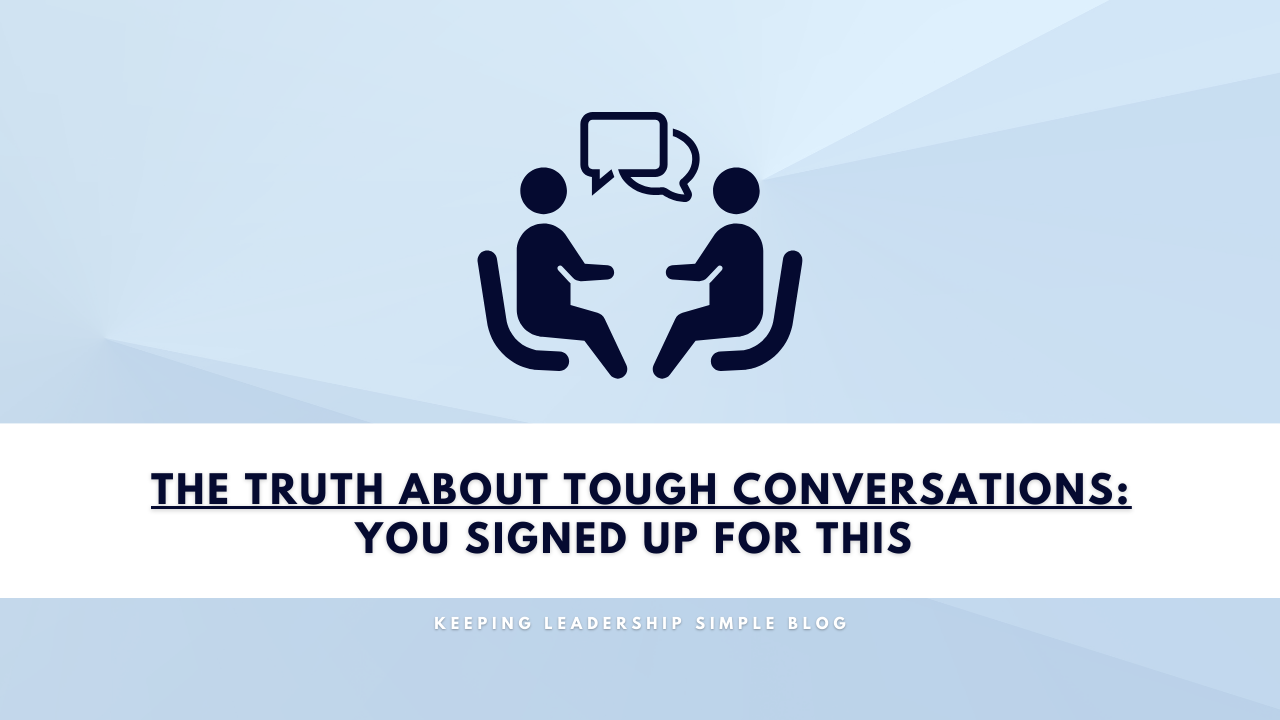The Truth About Tough Conversations: You Signed Up for This
May 07, 2025
Let's not dance around it—when you step into a leadership role, you don't just inherit a title, a team, or a corner office. You inherit responsibility. And one of the biggest responsibilities? Having tough conversations. Too many leaders dodge them like they're landmines. They tiptoe around poor performance, bad behavior, or unmet expectations, hoping the issue just disappears. Spoiler alert: it never does. In fact, it gets worse. It festers. It poisons morale. It damages credibility. So, let's get real: you can't be a true leader and avoid tough conversations. It's part of the job.
Accountability Isn't Optional
The number one job of any leader is simple: hold people accountable. It's not about micromanaging. It's not about nitpicking. It's about raising the standard and protecting the culture. And guess what? You can't hold anyone accountable without opening your mouth and saying the hard things. Want a high-performing team? Start with high-accountability leadership. That means when someone drops the ball, misses the mark, or crosses the line—you address it. Directly. Respectfully. Quickly. Because when you avoid those conversations, you're not being nice—you're being negligent.
Why Leaders Avoid Tough Talks (and Why It's a Mistake)
Let's be honest. Leaders avoid tough conversations for one main reason: they want to be liked. We've all been there. You don't want to ruffle feathers. You don't want the drama. You want a good vibe on the team. But here's the hard truth: If your need to be liked outweighs your duty to lead, you've already lost control of your culture. Your team doesn't need a buddy. They need a leader with the backbone to call out what needs to be called out—and the heart to lift them higher in the process.
Tough Conversations Don't Have to Be Long or Complicated
One of the biggest myths in leadership is that tough conversations have to be these long, emotional, soul-draining marathons. Wrong. Most tough conversations should be over in 3 to 5 minutes. That's it. This is not therapy. It's not a debate. It's not a guilt trip. It's clarity and course correction, plain and simple.
How to Prepare for a Tough Conversation Like a Pro
1. Get Clear on the Issue
Before you say a word, know exactly what the issue is. Be specific. "You're not doing a good job" is vague. "You've been 15 minutes late four times this week" is clear.
2. Have a Single Goal
Are you trying to stop a behavior? Set a boundary? Re-align performance? Know your mission and don't drift from it.
3. Practice the Core Message
Literally rehearse what you're going to say. Write it down if you have to. Keep it short and clean: "Your attendance has slipped. We need you here on time, consistently. This isn't optional."
4. Lead with Standards, Not Emotions
Don't make it personal. You're not scolding. You're leading. Talk about expectations and results, not your frustration or disappointment.
5. Use This One Powerful Line
I say this in nearly every tough conversation: "I have high expectations for you because I believe in your potential—and I need you to perform at a high level for the good of the team." It re-centers the message. You're not tearing them down. You're calling them up.
6. Anticipate Pushback, but Stay the Course
They might get defensive. That's human. Let them talk—but don't get dragged into excuses or rabbit holes. Nod. Acknowledge. And redirect.
What to Say (and Not Say) During the Conversation
Say this:
-
"This behavior is not acceptable moving forward."
-
"We need you to correct this immediately."
-
"I'm bringing this to you because I believe you can do better."
Avoid saying:
-
"I hate to bring this up..." (It weakens your authority.)
-
"Don't take this the wrong way..." (It confuses the message.)
-
"Everyone's been complaining about you..." (Now you've made it personal.)
The Cost of Avoidance Is Too High
Let me be blunt: every time you avoid a tough conversation, you lose a piece of your leadership edge.
-
You lose respect.
-
You lower the standard.
-
You confuse the rest of your team, who sees poor performance going unchecked.
And worst of all? You betray the very people you were trying to protect. Because holding someone accountable is one of the most powerful forms of belief. It says, "You are better than this. And I expect more because you can do more."
Lead with Backbone and Heart
Great leaders strike a rare balance: firm in their standards, generous in their belief. You don't have to yell. You don't have to shame. But you absolutely have to be direct. You absolutely have to hold the line. And you absolutely have to have the guts to say what others are too afraid to say. That's leadership. And if you're not ready for that, take off the badge, the nameplate, the title—because you're doing more harm than good.
Final Word: You Signed Up for This
Let's not sugarcoat it. When you chose to lead, you signed up for the hard stuff. The early mornings. The late nights. The big decisions. And yes, the tough conversations. But here's the reward: when you lead with truth, clarity, and courage, your team gets better. They grow. They respect you. And they start holding themselves to a higher standard. So don't shy away from the tough talks. Step into them—with confidence, with purpose, and with the heart of a true leader.
- Dean Crisp
Stay connected with news and updates!
Join our email list to receive the latest news and updates from the LHLN team!
We will never sell your information, for any reason.
